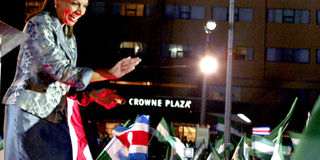Chinchilla headed for Costa Rica election win

Laura Chinchilla, presidential candidate for the National Liberation, waves to her supporters as she celebrates her victory in Costa Rica's presidential election in San Jose. REUTERS/Carlos Leon
What you need to know:
Facts about Chinchilla:
- Chinchilla, 50, is a career politician who was born into a political family and served as public safety minister, congressional deputy and most recently as vice president and justice minister in outgoing President Oscar Arias's cabinet.
- Chinchilla has promised to continue Arias's liberalizing economic policies and expand Costa Rica's web of free trade agreements. She has also backed liberalization of Costa Rica's state-controlled electricity and telecommunications sectors.
- Married with a teenage son, Chinchilla is a social conservative, opposing gay marriage, abortion and any change to Roman Catholicism's position as the state religion. Supporters regaled her with rosaries during her campaign, including one she wears constantly for good luck.
- During the campaign Chinchilla said she would boost education spending to 8 percent of gross domestic product as well as increase funding for law enforcement and create an anti-drug czar to oversee the growing struggle against drug smugglers who are using Costa Rica as a transit route.
Laura Chinchilla, a protege of Nobel peace laureate President Oscar Arias, was headed for a clear victory in Costa Rica's election on Sunday, which would make her the country's first female leader.
Chinchilla, who was Arias' vice president before she stepped down to make her presidential bid, won 47 percent of the preliminary vote count, and both the main opposition candidates quickly conceded defeat.
"I want to congratulate Laura Chinchilla, who is going to be the next president," said center-leftist Otton Solis, who opposes the free trade pacts championed by Arias and Chinchilla in the Central American nation.
Conservative Otto Guevara also conceded defeat.
With 44 percent of ballots counted, 47 percent of voters backed Chinchilla, 24 percent voted for Solis and 22 percent supported conservative candidate Guevara.
If she wins 40 percent or more of Sunday's vote, she will win outright, Chinchilla will avoid an April runoff. She has promised to follow Arias' policies, expanding free-trade accords and courting foreign investment.
She would follow in the footsteps of two other women leaders in traditionally male-dominated Latin America -- Chile's Michelle Bachelet and Argentina's Cristina Fernandez.
"With her, inequality would change," said Gretel Bonilla, a mother of three voting for Chinchilla on Sunday.
Popular with eco-tourists, surfers and U.S. and Canadian retirees for its lush jungles, volcanoes and relaxed lifestyle, Costa Rica is proud of its six decades of democratic elections and status as one of Latin America's most stable countries with a regional peacekeeping role.
Chinchilla's campaign was helped by Costa Rica's relatively smooth passage through the global economic crisis, although many in the country oppose her support of free trade accords.
Voters narrowly approved the region's CAFTA free trade deal with the United States in 2007. Opposition to the pact drew many voters to Solis, who staunchly opposes free trade agreements and narrowly lost to Arias in 2006.
Costa Rica, which has no army and avoided the bloody Cold War-era civil wars that ravaged its neighbors, is known for its low crime rates but is increasingly being used as a transit route by Mexican drug gangs.
Guevara played on crime concerns during his campaign, promising a firm hand on criminals. He would lengthen prison terms and soften controls on guns for law-abiding citizens.
Chinchilla's opponents tried to portray her as a placeholder for Arias, even though he says he will bow out of politics when his term ends.
Arias won the Nobel Peace Prize during his 1986-1990 term for helping to end Central America's civil wars and was re-elected to a second term in 2006 by a narrow margin. (Editing by Catherine Bremer)




